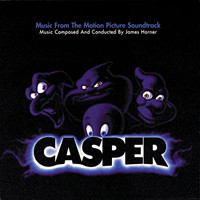- Composed by James Horner
- MCA / 73m
An adaptation of the old cartoon, Amblin’s Casper was directed by Brad Siberling and released with some success in the summer of 1995. The ghost falls in love with Christina Ricci, Eric Idle tries to get rid of him, Bill Pullman’s a ghost therapist, trying to find his dead wife – you know how it goes.
1995 was a busy year for James Horner. The four scores that are neither Apollo 13 nor Braveheart were overshadowed at the time, mostly because they were neither Apollo 13 nor Braveheart. But to be honest, writing Balto, Casper and Jumanji in a single year would count as a pretty spectacular achievement even without those two masterpieces on top. (I won’t mention Jade.)

A lot of Horner albums close with a lengthy track summarising the score’s main thematic ideas; unusually, Casper starts with one. There are three big thematic ideas in “No Sign of Ghosts” – comic music for the villains which is pure Nino Rota (almost certainly literally), a rambunctious theme for Ricci and her family and the astonishing “Casper’s Lullaby” for the ghost himself and more specifically his relationship with Ricci.
More on that one later because the next couple of tracks go into more depth exploring the other two themes – “Carrigan and Dibs” for the villains (with the Amacord-style music getting a bit of Danny Elfman female choir to go with it) and then “Strangers in the House” which is used both for the good humans and the good ghosts. The latter track’s second half then morphs into warm, gorgeous Americana. A couple of early set-pieces also offer one-off musical pieces of great quality – “The Swordfight” is a great Korngold knock-off, “The Lighthouse” a much more tender, innocent piece (with a music box). Late on, Horner got to indulge in some big band swing in “The Uncles Swing” which leads into the end title piece. Horner didn’t do Mickey Mousing very often (even when scoring animations) but there’s some A-grade versions of that style in this score, particularly the lengthy “Dying to be a Ghost” which treads that thin line between comic and actual horror.
That stuff’s all good to very good but it’s “Casper’s Lullaby” where the heart of the score is – it’s truly wonderful, one of the most lilting and beautiful of all James Horner themes. With two distinct parts – the first usually heard on piano, the second usually heavenly wordless choir – it is woven throughout the score and always makes a mark, but especially in its album arrangement late on. As fashions changed, later in his career Horner was frequently criticised by film critics for going too far with the emotional manipulation; back in 1995 it was still considered to be one of the primary purposes of film music and none did it better.
“Fond Memories” hints at it but also offers some fresh material (well, fresh-ish – in fact parts of it evoke fond memories of The Land Before Time) and a welcome reprise of the warm Americana from “Strangers in the House”. After the very long “Descent to Lazarus” (which is much more cheerful than its name implies and features with an absolutely fantastic Horner flourish for the brass section) there’s another wonderful reprise of the main theme in “One Last Wish”.
While it’s not quite a top-tier Horner score, Casper does feature a top-tier Horner theme and benefits somewhat from being both rather distinct from his other scores (only really in The Spiderwick Chronicles some time later would he write something particularly similar to this) and yet still firmly identifiable as him. Off to put “Casper’s Lullaby” on repeat… again…
Rating: ****
facebook.com/moviewave | twitter.com/MovieWaveDotNet | amazon.com












I agree with that it’s one of Horner’s best themes. I as well have fond memories of the time I watched this film in the theatre and let myself be manipulated by Horner’s emotional music. This is an interesting remark you made btw. I didn’t know Horner was accused of manipulating the audience. Can you link to a discussion of this topic? I’m a composer myself and I would love to know what exactly about his music was considered manipulation. Thanks!